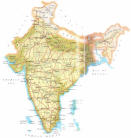India’s political landscape
 Miracles never cease to happen in India.
Miracles never cease to happen in India.
After a decade-long lay-off, the Congress, synonymous with the Nehru-Gandhi family, rode back to a position where it may be asked to steer the destinies of a billion people. In a convincing verdict, the world’s largest electorate inflicted a massive defeat on the country’s longest-lasting coalition of disparate political parties, the National Democratic Alliance headed by the Bharatiya Janata Party. It was an outcome that upset all calculations of pollsters and media pundits and one that went beyond Congress’s own expectations. It is now expected that Italian-born Sonia Gandhi, as leader of the party that won most seats in Parliament, would become India’s second woman prime minister. She will also be the fourth member of the Nehru family to occupy that office.
The results have brought doubtful relief to President Abdul Kalam whose task it will be, in the face of a hung parliament, to determine the tenability of clashing claims emanating from a welter of political formations welded on the spur of the moment to add up to the magical figure of 272 MPs in a house of 543 members. A day before the results, several scribes worked overtime to remind the President of his constitutional obligations in the event of a badly fractured verdict. Their recommendations ranged from calling the leader of the largest single party to inviting the leader of the largest single coalition of parties forged before the elections. But that has not worked in 1996 when President Shankar Dayal Sharma invited the Bharatiya Janata Party to form government. That government lasted only 13 days.
If media experts are to be believed, it is what they call the anti-incumbency factor that brought back the mothballed Congress warhorse into reckoning. This logic does not, however, adequately explain how the Marxists have managed to remain in office for nearly a quarter century in West Bengal or how the Congress Party itself headed by Jawaharlal Nehru and after him his daughter had an uninterrupted run of power at the center from 1947 to 1977. Even the man and wife duo of Laloo Prasad Yadav and Rabri Devi in the state of Bihar have kept anti-incumbency at bay for the last 13 years. Voters are not children who get tired of the same toy and howl for a new one.
The BJP blamed the exit polls for its debacle. Whether exit polls are ethical or not, they have caused havoc at the stock exchanges. On the day the state government of Chandrababu Naidu fell in Andhra Pradesh, sensex dropped by 229 points wiping out a capitalization of 55 billion rupees, damaging mostly the share base of the state-owned companies. However, the sensex recovered by 227 points within the first ten minutes of trading on Thursday, the day of the release of Parliament results. The Congress, if it is able to form a ministry, is unlikely to make drastic changes in economic policies because the party is sure to nominate Manmohan Singh as the finance minister. Singh was the author of economic reforms in 1991 under Rajiv Gandhi. The Congress returned to power in Andhra Pradesh promising free power to the farmer, a promise unrealizable without throwing the economy totally out of gear. If the party chooses to embrace the same populism at the center, the voters will surely shift their loyalties in another election.
The new government will have to live with the nagging problem of its allies holding it to ransom on crucial issues. Since principle is not the basic adhesive of a coalition it will not stand in the way of horse-trading. More than anything, the Congress has to evolve a minimum programme agreeable to all the parties that are its allies. Probable allies like Samajwadi Party or the Bahujan Samaj Party or the Dravida Munnetra Kazhagam are too powerful in their home bases for the Congress to handle. The left also, with new accretion to its strength in Parliament, is likely to push its agenda with greater confidence, something the non-Left allies in the coalition will resist. To evolve a common minimum policy acceptable to the motley is not going to be cakewalk.
In foreign policy area, the BJP took significant initiatives in restructuring relations with China and Pakistan. A memorable gain is the Chinese recognition of Sikkim as part of India. Vajpayee took personal interest in sending a cricket team to Pakistan that brought the diplomatic dialogue to the peoples’ level. It now becomes difficult to either government to employ the old rhetoric to keep the people of the two countries apart. Congress President Sonia Gandhi said that the new government would continue the peace process with Pakistan initiated by outgoing Prime Minister Atal Bihari Vajpayee. The Congress party is committed to nurturing good neighborly relations with Pakistan and to discussing all issues with it under the framework of the Simla Agreement, according to Natwar Singh, chairman of the Congress foreign affairs department. As a matter fact, changes of guard have never seen shifts in foreign policy that remained nearly the same since 1947. It is mostly a flexible portfolio of diplomatic perceptions.
Of significance is the BJP entry into south that remained impregnable for a long time. At the time of writing, the BJP is vying with the depleted Congress party to form government in Karnataka with support from a Janata Dal splinter group. The BJP continues to govern such big states as Madhya Pradesh, Gujarat and Rajasthan besides the much smaller Chattisgarh. It is a partner in the government that rules Orissa in the east. This is the first time since independence that the Congress has no MP from Kerala. The Left, like the Congress, made additional gains apart from winning a seat in Kolkata after 18 years. Adding to BJP’s debacle are the poor returns made by three of its major allies, the AIADMK of Jayalalithaa in Tamil Nadu, Telugu Desam Party in Andhra Pradesh and the Trinamul Congress of Mamata Banerjee in West Bengal.
Instead of resting on questionable theoretical crutches, both polity and media will do well to accept the most convincing reason for the rapidly changing inclinations of the electorate, that is, illiteracy. More than two-thirds of the Indian electorate is illiterate, a factor that substitutes emotion for information. It is appalling that political parties can arouse people’s passions, even in the third millennium, in the name of religion and caste and heroes and heroines of a bygone age. The greatest priority of the present government should therefore be to take education to every village and hamlet, a priority next only to food. The Congress must not delude itself that the people have voted for secularism of the skewed kind that imparted legitimacy to communalism.
Water continues to be as crucial to the lives of the people as it is for the political class to win votes. Development should now reach areas where it is just a campaigning slogan. Water is necessary both for agriculture and for the thirsty millions living in the countryside. Village roads and electrification are no less important. The BJP lost because it lost touch with rural realities. The result must make all parties realize how crucial is the rural vote. The spectacle of shining expressways running parallel to mud tracks in villages cannot showcase development. It ought to begin at the grassroots.
Nobody in a democracy can question the judgment of the people. Yet it must be said to the credit of Atal Behari Vajpayee that the country had not seen a prime minister of that stature after Nehru. He is the only non-Congress prime minister to win three successive terms. A man of great vision he wanted that India should shine. Shine it did in select sectors. Once he became the Prime Minister, he belonged to India and not to any party. India above all was his motto. He headed the first coalition to complete five years in office. Governance and development were his slogans that unfortunately did not appeal to the masses whose needs were different. As Vir Sanghvi of the Hindustan Times says, “History will remember Atal Bihari Vajpayee as one of India’s finest prime ministers.” More than anything, he elevated the much maligned coalition politics to the highest levels of substance and respectability.
Dasu Krishnamoorty
Special for Pravda.Ru
Subscribe to Pravda.Ru Telegram channel, Facebook, RSS!





